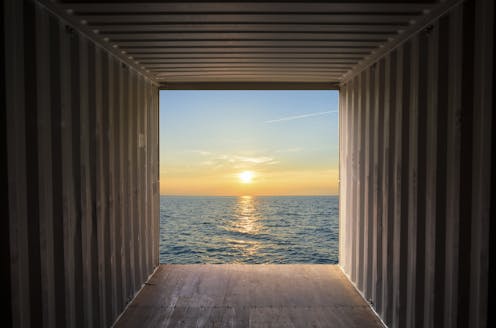A month at sea with no technology taught me how to steal my life back from my phone
- Written by Robert Hassan, Professor, School of Culture and Communication, University of Melbourne

A survey this year revealed that Australians, on average, spend 10.2 hours a day with interactive digital technologies. And this figure goes up every year.
This is time we don’t get back. And our analogue lives, which include everything not digital, shrink in direct proportion.
I recently decided to spend four weeks at sea without access to my phone or the internet, and here’s what I learnt about myself, and the digital rat race I was caught in.
Cold turkey
Until a year or so ago, I was a 10.2 hours a day person. Over the years, dependence on technology and stress had destroyed any semblance of balance in my life – between work and home, or pleasure and obligation.
I wanted to quit, or cut down, at least. Tech “detox” apps such as the time-limiting Screen Time were useless. Even with these, I was still “on”, and just a click away from unblocking Instagram.
Read more: More of us are opting for 'digital detox' holidays
So I thought: what about going cold turkey? No screen time at all, 24/7. Was that possible, and what would it feel like?
My commute to work passed the Footscray docks, where container-ships come and go. Passing one day, I wondered if it was possible to go on one of those ships and travel from Melbourne to … somewhere?
Turns out it was. You can book a cabin online and just go. And in what was probably an impulse, I went.
For about four weeks I had no devices, as I sailed solo from West Melbourne to Singapore.
I wanted to experiment, to see what it felt like to take a digital detox, and whether I could change my habits when I returned home.
What I learnt
Cold turkey withdrawal is difficult. Even in prison, many inmates have access of some kind of device.
The time on that ship taught me there is a whole other side to life, the non-digital side, that gets pushed aside by the ubiquitous screen.
Real life contains people, conversations, flesh and textures that are not glass or plastic.
It also contains whole worlds that exist inside your head, and these can be summoned when we have the time, and devote a bit of effort to it.
These are worlds of memory and imagination. Worlds of reflection and thought. Worlds you see differently to the pallid glare of a screen.
I took four books with me and read them in a way I hadn’t before: slower, deeper and with more contemplation. The words were finite (and therefore precious).
I’d never spent time like this in my whole life, and was inspired to write about it in detail.
Read more: Waiting: rediscovering boredom in the age of the smartphone
Of course, we all have our own commitments and can’t always do something like this.
But away from the screen, I learned a lot about our digital world and about myself, and have tried to adapt these lessons to “normal” life.
Since I’ve been back, it feels like some sense of balance has been restored. Part of this came from seeing the smartphone as a slightly alien thing (which it is).
And instead of being something that always prompts me, I flipped the power dynamic around, to make it something I choose to use - and choose when to use. Meaning sometimes it’s OK to leave it at home, or switch it off.
If you can persist with these little changes, you might find even when you have your phone in your pocket, you can go hours without thinking about it. Hours spent doing precious, finite, analogue things.
How to get started
You could begin by deleting most of your apps.
You’ll be surprised by how many you won’t miss. Then, slowly flip the power dynamic between you and your device around. Put it in a drawer once a week - for a morning, then for a day - increasing this over time.
Read more: Do you 'zombie check' your phone? How new tools can help you control technology over-use
If this sounds a bit like commercial digital detox self-care, then so be it. But this is minus the self-care gurus and websites. Forget those.
No one (and no app) is really going to help you take back your agency. You need to do it yourself, or organise it with friends. Perhaps try seeing who can go the furthest.
After a few weeks, you might reflect on how it feels: what’s the texture of the analogue world you got back? Because, more likely than not, you will get it back.
For some, it might be a quieter and more subjective pre-digital world they half remember.
For others, it might be something quite new, which maybe feels a bit like freedom.
Authors: Robert Hassan, Professor, School of Culture and Communication, University of Melbourne





